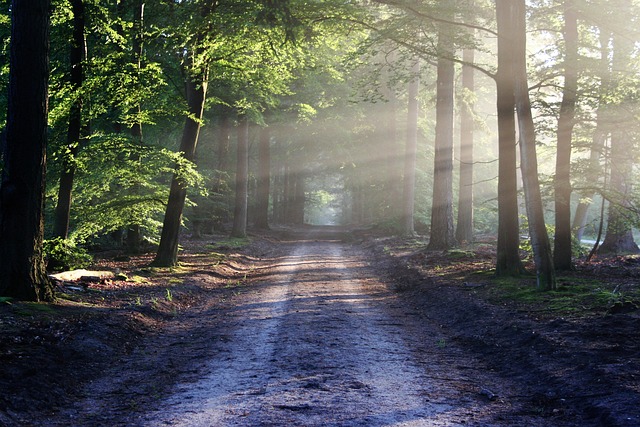Earth Day is not just another holiday to mark on our calendars; it is a pivotal moment that calls upon humanity to pause, reflect, and reconnect with the breathtaking world we call home. As we marvel at the majestic landscapes that span continents and marvel at the sheer diversity of life on Earth, we are reminded of nature’s profound significance in shaping our existence. From the lush rainforests to the mighty oceans, nature has generously provided us with boundless resources, life-saving remedies, and a sanctuary to find solace. In celebration of Earth Day, we invite you to embark on a profound journey of introspection through the power of writing prompts, allowing us to rediscover the awe-inspiring wonders of nature and its undeniable impact on our lives. Join us as we delve into the depths of our souls, inspired by the beauty that surrounds us, uniting with the earth on this momentous day.
Contents
- Writing Prompts Earth Day: Reflect on Nature’s Importance
- The Beauty of Nature: Explore the Wonders that Surround Us
- Discover the Impact of Human Activities on the Environment
- Understanding the Vital Role of Biodiversity for a Healthy Planet
- The Healing Power of Nature: How Being Outdoors Benefits Our Well-being
- Taking Action: Simple Steps to Protect and Preserve Our Natural Environment
- Teaching Future Generations: Engaging Children in Environmental Education
- 1. Outdoor Exploration:
- 2. Hands-On Projects:
- Inspiring Change: Effective Ways to Spread Awareness about Earth Day
- Live in Harmony with Nature: Sustainable Practices for a Greener Future
- Frequently Asked Questions
- In Summary
Writing Prompts Earth Day: Reflect on Nature’s Importance
Every year on April 22nd, people from all around the world come together to celebrate Earth Day, a day dedicated to increasing awareness and appreciation for the Earth’s environment. It is a time for reflection, a time to acknowledge the immense importance of nature in our lives.
Nature is intricately woven into the fabric of our existence. It provides us with the air we breathe, the food we eat, and the water we drink. Beyond these basic necessities, nature nurtures our physical and mental well-being. The sight of lush green forests, the sound of waves crashing on the shore, or the smell of blooming flowers all have a profound effect on our senses, often inducing a sense of calm and tranquility.
When we experience nature, whether by taking a leisurely walk through a park or marveling at the grandeur of a mountain range, we reconnect with something primal within us. We become aware of our place in the world and our responsibility to protect and preserve it for future generations.
However, our busy lives often disconnect us from nature, leaving us unaware of its importance. This Earth Day, let us take a moment to reflect on the role nature plays in our daily lives and how our actions impact its delicate balance.
- Reconnect with nature: Spend time outdoors, take a hike, go for a swim, or simply sit in a park. Allow yourself to be immersed in the natural beauty around you.
- Educate yourself: Learn about environmental issues and how they affect our planet. Awareness is the first step towards making positive changes.
- Practice sustainability: Make conscious choices to reduce your carbon footprint. Recycle, conserve water and energy, and support businesses that prioritize eco-friendly practices.
By reflecting on nature’s importance this Earth Day, we can reignite our passion for preserving the incredible wonders our planet has to offer. Let us not take nature for granted but instead strive to be stewards of the Earth, ensuring future generations can enjoy the beauty and benefits of the natural world.
The Beauty of Nature: Explore the Wonders that Surround Us
The world is filled with an array of breathtaking sights, each offering a unique glimpse into the beauty of nature that surrounds us. From towering mountain peaks to cascading waterfalls and vibrant meadows, exploring these wonders can awaken a sense of awe and appreciation within us. Nature has an incredible power to heal, inspire, and connect us to something greater than ourselves.
Immerse yourself in the stunning landscapes that Mother Earth has to offer, and you’ll discover countless hidden treasures. The majestic forests, with their towering trees and diverse wildlife, invite you to delve into their peaceful embrace. Marvel at the intricate patterns of a delicate butterfly’s wings and the vibrant hues of flowers that adorn the meadows. The rhythmic crashing of waves against the coastline serves as a reminder of nature’s raw power, while the gentle sway of a field of golden wheat soothes the soul.
- Every sunset paints the sky in hues of gold, pink, and orange, creating a breathtaking masterpiece that changes with each passing moment.
- The tranquil serenity of a secluded forest path allows for a moment of solitude and reflection, away from the noise and chaos of everyday life.
- Witness the symphony of birdsong as you explore the lush greenery of a vibrant rainforest, a testament to the incredible diversity of life on our planet.
- Stand in awe before the power of a mighty waterfall as it crashes down, sending sprays of mist into the air, refreshing both body and spirit.
The beauty of nature is a gift that surrounds us every day, waiting to be explored. It is a reminder of our place in the world and the importance of preserving and cherishing these wonders for future generations. So, venture out into the great outdoors and let nature’s embrace captivate your heart, mind, and soul.
Discover the Impact of Human Activities on the Environment
Human activities have a profound impact on the environment, shaping the world we live in today. From the burning of fossil fuels to deforestation and pollution, these actions have contributed to a wide range of environmental issues. One of the key consequences is climate change, which is causing rising temperatures, extreme weather events, and melting glaciers.
Furthermore, human activities have also led to habitat loss and the endangerment of numerous plant and animal species. Deforestation, for example, not only affects the balance of oxygen and carbon dioxide levels in the atmosphere but also destroys the homes and ecosystems of countless species. Additionally, pollution from industries, agriculture, and transportation not only affects air and water quality but also has detrimental effects on human health.
- Burning of fossil fuels
- Deforestation
- Pollution from industries, agriculture, and transportation
As we become more aware of the impact of human activities on the environment, it is crucial that we take action to mitigate these effects. By implementing sustainable practices and reducing our carbon footprint, we can help slow down climate change and preserve the Earth for future generations.
Key impacts of human activities on the environment:
- Rising temperatures and climate change
- Habitat loss and species endangerment
- Air and water pollution
- Disruption of ecosystems
- Health implications for humans
Understanding the Vital Role of Biodiversity for a Healthy Planet
Biodiversity plays a crucial role in maintaining a healthy planet. It refers to the variety of plant and animal species that coexist in ecosystems, encompassing everything from microorganisms to towering trees. Without a rich and diverse range of species, our planet would struggle to thrive. Let’s explore the key reasons why biodiversity is vital for the health and well-being of our planet:
1. Ecosystem Balance: Biodiversity ensures the balance and stability of ecosystems. Each species has a unique role to play in the intricate web of life. For instance, predators help control populations of other species, preventing overpopulation. Pollinators such as bees and butterflies facilitate the reproduction of plants, allowing them to produce food and oxygen. By maintaining a diverse range of species, ecosystems can effectively function and adapt to environmental changes.
2. Resilience to Climate Change: Biodiversity acts as a buffer against climate change impacts. A diverse ecosystem is better equipped to withstand disturbances caused by extreme weather events, such as hurricanes or droughts. Different species have various adaptations that enable them to tolerate and recover from these challenges. Therefore, preserving biodiversity is essential in building resilient ecosystems that can withstand the effects of a changing climate.
The Healing Power of Nature: How Being Outdoors Benefits Our Well-being
There is something truly magical about stepping outside and immersing ourselves in nature. The healing power that nature holds is undeniable, offering countless benefits for our overall well-being. Spending time outdoors not only allows us to escape the hustle and bustle of our daily lives but also has a profound impact on both our physical and mental health.
One of the remarkable ways nature contributes to our well-being is through reducing stress and anxiety. As we explore the great outdoors, surrounded by breathtaking landscapes, our bodies respond by automatically releasing endorphins, also known as the “feel-good” hormones. These natural chemicals bring about a sense of euphoria, helping us feel more relaxed and content. By soothing our minds, nature acts as a much-needed therapy session, alleviating the pressures of our modern lifestyles.
- Boosts mood and promotes happiness
- Enhances creativity and cognitive function
- Strengthens the immune system
Another incredible advantage of embracing nature is its ability to boost our mood and promote happiness. When we spend time outdoors, our senses come alive, absorbing the vibrant colors, fresh scents, and calming sounds of nature. This sensory experience has a profound impact on our emotional well-being, helping to alleviate symptoms of depression and anxiety. Furthermore, the sense of awe and wonder that nature evokes nourishes our souls, providing a deeper appreciation for life.
Not only does nature have a positive influence on our mental well-being, but it also enhances our cognitive function and creativity. Being surrounded by nature’s wonders stimulates our minds, allowing for greater clarity, focus, and problem-solving abilities. Studies have shown that spending time outdoors improves memory retention, attention span, and overall cognitive performance. Whether it’s by embarking on a hike or simply sitting beneath a majestic tree, nature provides the perfect environment for our brains to thrive.
Furthermore, the great outdoors can play a vital role in strengthening our immune system. When we disconnect from the urban chaos and step into nature’s embrace, we expose ourselves to a wide range of beneficial microorganisms, boosting our immune response and reducing the risk of illness. Breathing in fresh air, enriched with oxygen and phytoncides present in plants, supports respiratory health and strengthens our bodies’ natural defense mechanisms.
Taking Action: Simple Steps to Protect and Preserve Our Natural Environment
Our natural environment is facing increasingly urgent threats, and it’s up to each and every one of us to take action and make a difference. Thankfully, there are simple yet impactful steps we can all take to protect and preserve our precious ecosystems. By making conscious choices and adopting sustainable practices, we can safeguard biodiversity, reduce pollution, and ensure a healthier planet for future generations.
1. Reduce, Reuse, Recycle: One of the most effective ways to minimize our environmental footprint is to follow the mantra of “reduce, reuse, recycle.” Start by reducing your consumption of single-use items such as plastic bags, bottles, and packaging. Embrace reusable alternatives like cloth bags, water bottles, and food containers. When possible, repair and repurpose items instead of discarding them. Lastly, make sure to recycle items that can be recycled in your area, such as paper, glass, and plastic, to minimize waste.
2. Embrace Sustainable Transport: Our means of transportation greatly impact the environment. Whenever feasible, choose eco-friendly options like walking, cycling, or using public transportation. If you must drive, consider carpooling or opt for an electric or hybrid vehicle. By reducing emissions and congestion, we can contribute to cleaner air quality and decreased carbon emissions, helping combat climate change.
Teaching Future Generations: Engaging Children in Environmental Education
Environmental education plays a vital role in shaping our future generations to become responsible stewards of the Earth. By engaging children in interactive and hands-on activities, we can ignite their curiosity and develop a deep connection with the environment. Here are some fun and effective ways to make environmental education engaging for children:
1. Outdoor Exploration:
Take children outside and let them discover the wonders of nature firsthand. A hike through a local park or a visit to a nearby pond can provide endless learning opportunities. Encourage them to observe plants, insects, and animals, while discussing their importance and the impact of humans on their habitats.
2. Hands-On Projects:
Engage children in exciting projects that let them actively participate in protecting the environment. Creating a compost bin, starting a garden, or building birdfeeders are just a few examples of hands-on activities that can teach them about waste reduction, biodiversity, and the interconnectedness of ecosystems. These projects encourage critical thinking and problem-solving skills, while also fostering a sense of accomplishment and responsibility in young learners.
Inspiring Change: Effective Ways to Spread Awareness about Earth Day
Earth Day is a momentous occasion that reminds us of the importance of taking care of our planet. It serves as a platform for individuals and communities worldwide to come together and make a positive impact on the environment. If you’re looking for effective ways to spread awareness about Earth Day, here are some inspiring ideas:
- Organize community clean-up events: Gather friends, family, and neighbors to clean up local parks, beaches, or neighborhoods. Creating a sense of shared responsibility for keeping our surroundings clean and pristine will encourage others to follow suit.
- Engage in tree-planting campaigns: Trees play a crucial role in combating climate change. Organize tree-planting events in your area or collaborate with local organizations dedicated to reforestation. Not only will this contribute to a healthier environment, but it also beautifies public spaces.
- Spread the word through social media: Utilize the power of social media platforms to communicate important messages about Earth Day. Share informative posts, captivating videos, and eye-catching infographics that highlight the significance of environmental conservation. Encourage friends and followers to join the cause by using hashtags such as #EarthDay and #ProtectOurPlanet.
By implementing these effective strategies, we can inspire change and maximize the impact of Earth Day. Remember, even small actions can make a big difference when it comes to preserving our planet for future generations. Celebrate Earth Day not only on April 22 but every day of the year, as the protection of our environment requires constant commitment and dedication.
Live in Harmony with Nature: Sustainable Practices for a Greener Future
When it comes to creating a greener future, living in harmony with nature is crucial. By adopting sustainable practices, we can not only reduce our carbon footprint but also preserve the environment for future generations. Here are some simple yet impactful ways to integrate sustainability into your daily life:
- Conserve Water: Start by reducing water consumption in your home. Fix leaky faucets, collect rainwater for gardening, and opt for low-flow showerheads and toilets to conserve this precious resource.
- Eat Sustainably: Make conscious choices when it comes to food. Opt for locally sourced, organic produce to support local farmers and reduce the carbon emissions associated with transportation. Try embracing a plant-based diet or reduce meat consumption to mitigate the environmental impact of animal farming.
- Embrace Renewable Energy: Transitioning to renewable energy sources is an excellent way to minimize your environmental impact. Consider installing solar panels on your rooftop or supporting renewable energy projects in your community.
Living in harmony with nature is a mindset that extends beyond our immediate surroundings. It’s about recognizing our responsibility as stewards of the earth and making conscious choices in our daily lives. By implementing these sustainable practices, we can pave the way towards a greener, healthier future for ourselves and the planet.
Frequently Asked Questions
Q: What is Earth Day?
A: Earth Day is an annual international event celebrated on April 22nd to raise awareness and inspire action towards protecting the environment and promoting sustainable practices.
Q: Why is Earth Day important?
A: Earth Day reminds us of the critical role nature plays in our lives. It encourages us to reflect on the importance of preserving our planet’s biodiversity, reducing pollution, and embracing sustainable lifestyles to secure a healthier future for ourselves and generations to come.
Q: What are writing prompts?
A: Writing prompts are thought-provoking statements or questions used to inspire and stimulate creative writing. They are designed to spark ideas and encourage individuals to explore various topics or themes in their writing.
Q: How can writing prompts be used to reflect on Earth Day?
A: Writing prompts related to Earth Day help us delve into the significance of nature and environmental conservation. They can prompt us to examine our connections to the natural world, express gratitude for its resources, or explore ways to contribute to a greener, sustainable future.
Q: Can you provide some Earth Day writing prompts examples?
A: Sure! Here are a few Earth Day writing prompts:
1. Describe a meaningful experience you’ve had in nature and its impact on you.
2. Imagine a world without trees. Write about the consequences and how it would change our lives.
3. Reflect on a small change you’ve made in your daily routine to reduce your environmental footprint and its effects.
4. Create a story about a superhero whose power is to protect the environment.
5. If you were an animal living in a polluted ecosystem, how would you feel? Write a diary entry expressing your emotions.
Q: How can writing prompts enhance our understanding of Earth Day concepts?
A: Writing prompts encourage introspection and thoughtful exploration, enabling us to delve deeper into Earth Day themes. By putting our thoughts and emotions into words, we can solidify our understanding of these concepts and foster a greater connection to nature.
Q: Can writing prompts be beneficial for environmental awareness?
A: Absolutely! Writing prompts can serve as a valuable tool to raise environmental awareness. They encourage individuals to contemplate environmental issues, explore different perspectives, and inspire them to take action by sharing their thoughts and ideas with others.
Q: Who can benefit from using Earth Day writing prompts?
A: Anyone interested in reflecting on the importance of nature and Earth Day can benefit from using writing prompts. Writers, students, educators, and individuals who simply enjoy expressing themselves through writing can find inspiration and deepen their understanding of environmental issues using these prompts.
Q: How can I get started with Earth Day writing prompts?
A: To get started with Earth Day writing prompts, choose a prompt that resonates with you. Set aside some time in a quiet, natural setting where you feel comfortable and let your thoughts flow. Focus on connecting with your emotions and explore your personal experiences and ideas related to Earth Day and the environment.
Q: Can I share my writings based on these prompts with others?
A: Absolutely! Sharing your writings based on Earth Day writing prompts can be a wonderful way to create dialogue and raise awareness. You can post your work on social media platforms, contribute to online forums or blogs, or organize local events where you can read your work aloud, sparking conversations and inspiring others to reflect on the importance of nature.
In Summary
In conclusion, Earth Day serves as a timely reminder to appreciate and reflect upon the crucial role of nature in our lives, inspiring us to become better stewards of our planet. Let’s continue to cherish and protect the beauty and riches that Mother Earth has bestowed upon us.









